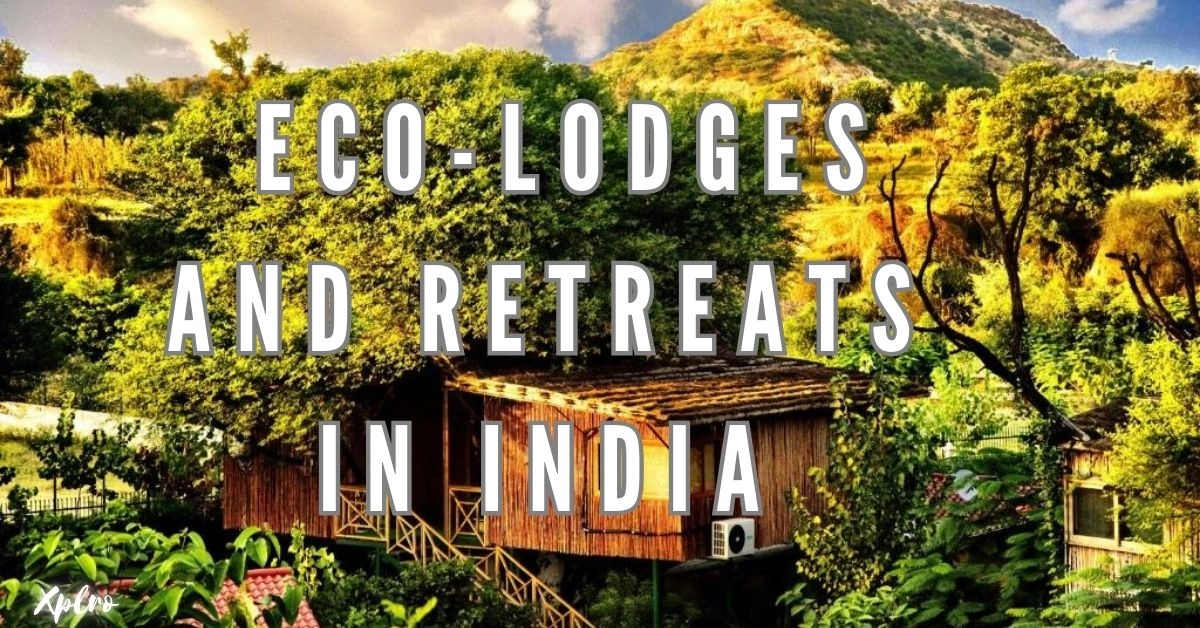Eco-Lodges and Retreats in India; India, with its diverse landscapes and cultural heritage, is a popular travel destination. As tourism grows, it’s important to travel in a way that protects the environment. Eco-lodges and retreats are a great choice for travelers who want to see India’s natural beauty without harming nature. Here are 10 of the best eco-lodges and retreats in India:
- 1. Vana Retreat, Uttarakhand
- 2. CGH Earth Spice Coast Cruises, Kerala
- 3. The Tree House Resort, Rajasthan
- 4. The Neora Valley Jungle Camp, West Bengal
- 5. The Leela Kovalam Beach, Kerala
- 6. Samode Haveli, Rajasthan
- 7. SwaSwara, Karnataka
- 8. Wildflower Hall, Himachal Pradesh
- 9. Banjaar Tola, Madhya Pradesh
- 10. The Himalayan Village, Himachal Pradesh
- FAQs
1. Vana Retreat, Uttarakhand

Nestled amidst the lush Himalayan foothills, Vana Retreat offers a harmonious blend of luxury and sustainability. This exceptional wellness resort focuses on holistic well-being, providing yoga, Ayurveda, and nature therapies.
Sustainability Initiatives:
- Organic Farming: Vana cultivates its own herbs and vegetables organically, ensuring fresh, locally sourced meals.
- Water Conservation: The resort employs advanced water management systems, including rainwater harvesting and wastewater recycling.
- Community Engagement: Vana actively supports the local economy by collaborating with artisans and farmers.
By prioritizing sustainability, Vana Retreat provides an unforgettable experience that aligns with responsible travel practices.
2. CGH Earth Spice Coast Cruises, Kerala
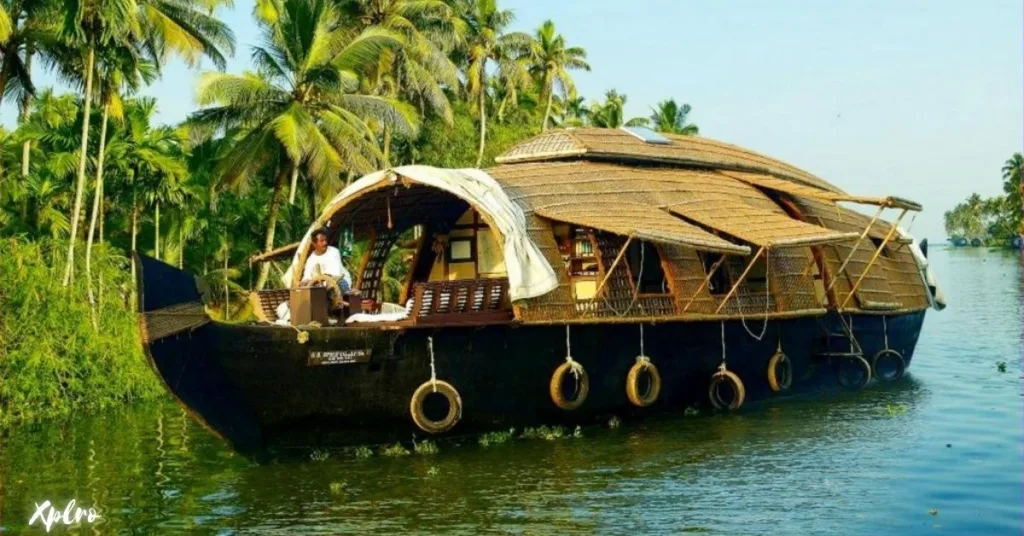
Discover the enchanting backwaters of Kerala aboard CGH Earth’s eco-friendly houseboats. These sustainable cruises offer an intimate glimpse into the region’s rich culture and biodiversity.
Sustainability Features:
- Solar-Powered Boats: Reduce your carbon footprint with CGH Earth’s solar-powered houseboats.
- Local Cuisine: Savor authentic Kerala cuisine prepared with fresh, locally sourced ingredients.
- Environmental Education: Learn about the delicate backwater ecosystem and the importance of conservation.
Embark on a sustainable adventure with CGH Earth and experience the beauty of Kerala’s backwaters.
3. The Tree House Resort, Rajasthan
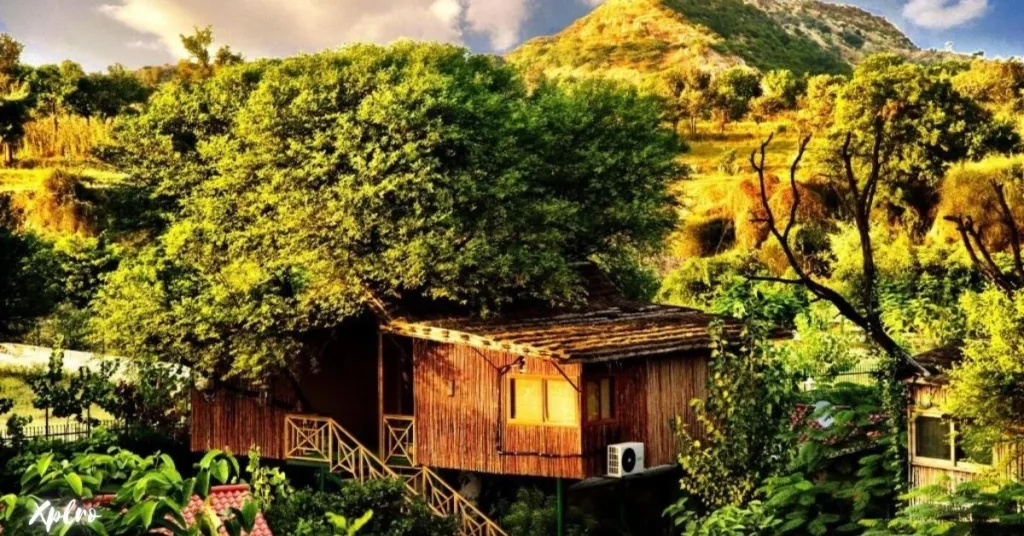
Escape to the serene Aravalli hills and experience the magic of The Tree House Resort. Nestled amidst lush forests, this unique retreat offers luxurious treehouses with breathtaking views.
Sustainability Initiatives:
- Eco-Friendly Architecture: The resort is designed to minimize its environmental footprint, using sustainable materials and construction techniques.
- Wildlife Conservation: The Tree House Resort actively supports local conservation efforts to protect the region’s biodiversity.
- Water Management: The property implements efficient water use practices, including drip irrigation for its gardens.
Immerse yourself in nature and sustainability at The Tree House Resort.
4. The Neora Valley Jungle Camp, West Bengal
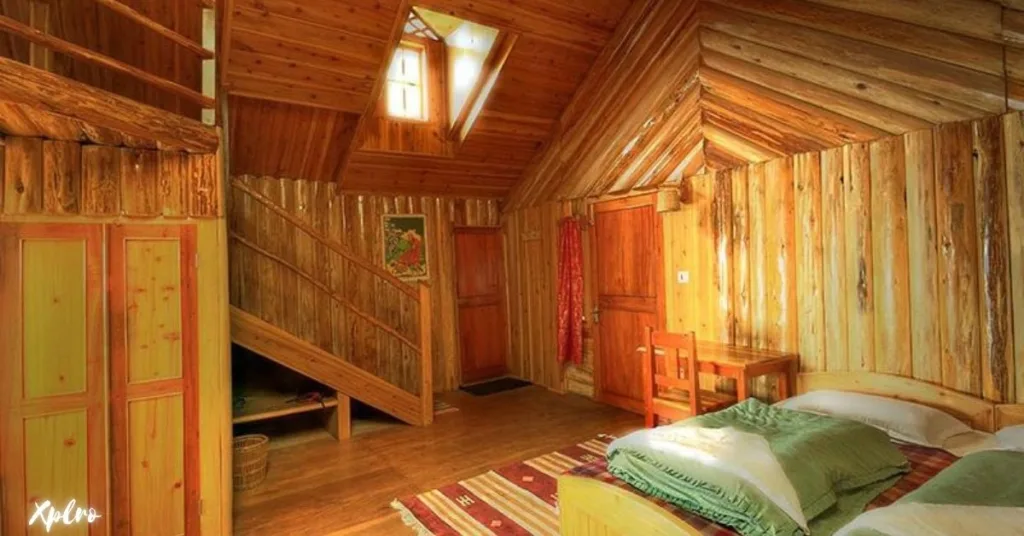
Discover the beauty of Neora Valley National Park at the charming Neora Valley Jungle Camp. This eco-friendly lodge offers a rustic yet comfortable experience for nature enthusiasts and wildlife lovers.
Sustainability Features:
- Minimal Impact Construction: The camp is built using local materials and traditional techniques, ensuring minimal disruption to the natural environment.
- Forest Conservation: Support local conservation efforts to protect endangered species and their habitats.
- Waste Management: The lodge practices responsible waste management, including segregation and recycling.
Immerse yourself in the natural wonders of Neora Valley while staying at this sustainable retreat.
5. The Leela Kovalam Beach, Kerala

Indulge in luxury and sustainability at The Leela Kovalam Beach. This stunning resort offers breathtaking views of the Arabian Sea and combines modern amenities with eco-friendly practices.
Sustainability Initiatives:
- Energy Efficiency: The resort prioritizes energy efficiency, using solar power and other sustainable energy sources.
- Local Sourcing: Enjoy delicious cuisine made with organic and locally sourced ingredients, supporting local farmers.
- Biodiversity Promotion: The resort’s lush gardens provide a habitat for native flora and fauna, promoting biodiversity.
Experience the best of both worlds at The Leela Kovalam Beach: a luxurious escape that respects the environment.
6. Samode Haveli, Rajasthan
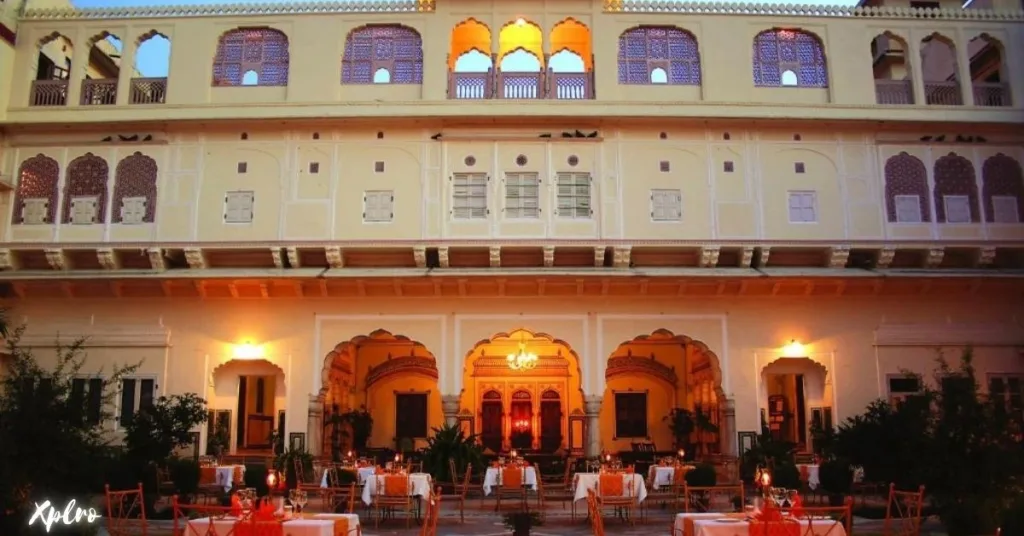
Discover the timeless elegance of Samode Haveli, a beautifully restored heritage hotel in Jaipur. This stunning property offers a luxurious experience while respecting its traditional architecture.
Sustainability Features:
- Heritage Preservation: The restoration of Samode Haveli uses traditional techniques to preserve the region’s cultural heritage.
- Community Support: The hotel supports local artisans and promotes handicrafts, contributing to the local economy.
- Waste Reduction: Samode Haveli implements composting and recycling programs to minimize its environmental impact.
Experience the perfect blend of luxury and sustainability at Samode Haveli.
7. SwaSwara, Karnataka
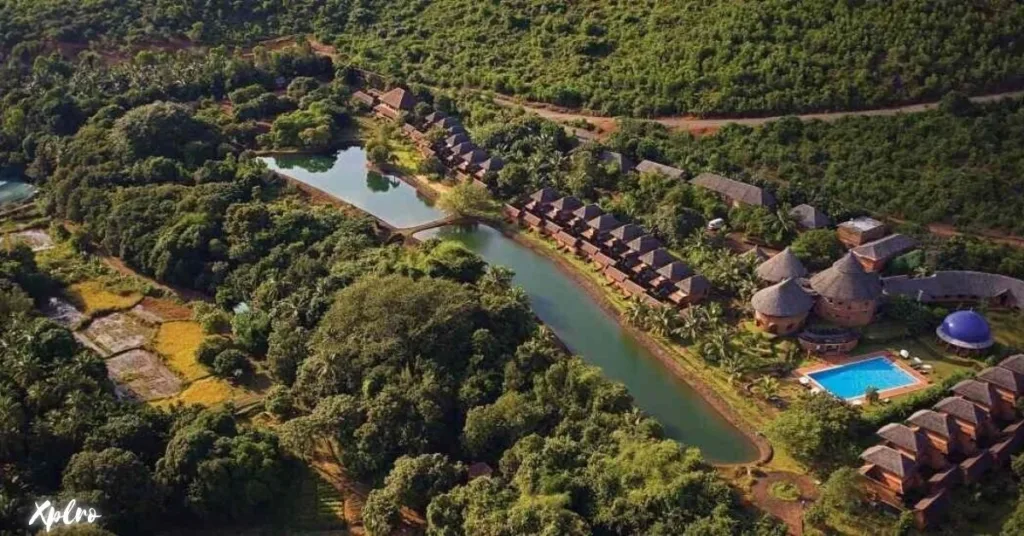
Discover tranquility at SwaSwara, a wellness retreat nestled on the pristine Om Beach in Gokarna, Karnataka. Focus on holistic health and wellness through yoga and Ayurveda.
Sustainability Features:
- Sustainable Design: The cottages are built using local materials and eco-friendly construction practices.
- Organic Gardens: Enjoy fresh, organic produce grown on SwaSwara’s own gardens.
- Community Involvement: The retreat actively supports local initiatives and community development programs.
Experience a rejuvenating escape at SwaSwara, where wellness meets sustainability.
8. Wildflower Hall, Himachal Pradesh

Discover the breathtaking beauty of the Himalayas at Wildflower Hall, a luxurious resort that blends elegance with sustainability.
Sustainability Initiatives:
- Recycling Programs: The resort is committed to environmental responsibility and has implemented comprehensive recycling and waste management systems.
- Local Sourcing: Support the local economy by enjoying delicious cuisine prepared with fresh, locally sourced ingredients.
- Conservation Efforts: Participate in local wildlife conservation initiatives and enjoy eco-friendly activities during your stay.
Experience the perfect combination of luxury and sustainability at Wildflower Hall.
9. Banjaar Tola, Madhya Pradesh
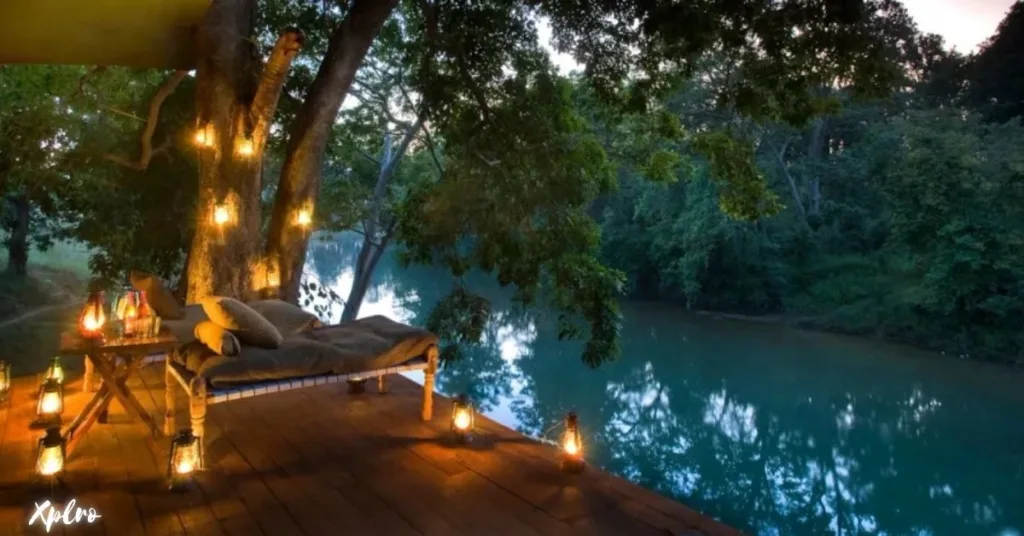
Discover the beauty of Kanha National Park at Banjaar Tola, an eco-friendly lodge that offers luxurious accommodations amidst the lush landscapes.
Sustainability Features:
- Eco-Friendly Construction: The lodge is built using sustainable materials and techniques, minimizing its environmental impact.
- Wildlife Conservation: Support wildlife conservation initiatives and engage in responsible tourism practices at Banjaar Tola.
- Solar Energy: The lodge utilizes solar power, promoting renewable energy and reducing its carbon footprint.
Experience the thrill of wildlife safaris while staying at this sustainable retreat.
10. The Himalayan Village, Himachal Pradesh
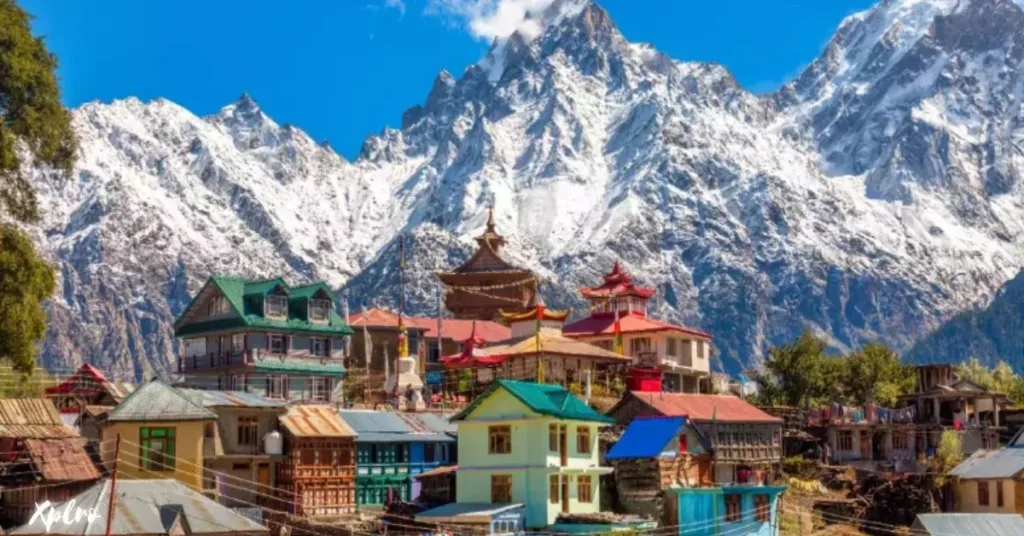
Experience the charm of traditional Himachali architecture at The Himalayan Village, a unique eco-resort nestled amidst the Himalayas. Immerse yourself in the local culture and natural beauty.
Sustainability Initiatives:
- Renewable Resources: The resort harnesses renewable energy through solar panels for heating water and rainwater harvesting systems.
- Cultural Preservation: Support local artisans and craftspeople by exploring the Himalayan Village’s cultural offerings.
- Waste Management: The resort practices responsible waste management, including segregation and composting.
Discover a sustainable and authentic Himalayan experience at The Himalayan Village.
Conclusion, Eco-Lodges and Retreats in India
Immersing yourself in India’s breathtaking landscapes goes beyond just the scenery. Choosing eco-lodges and retreats on your travels promotes sustainable tourism practices that benefit the environment, local communities, and cultural heritage. By supporting these responsible establishments, you contribute to environmental conservation efforts, community development projects, and the preservation of India’s rich cultural tapestry. For a truly enriching and responsible travel experience, explore the wide range of eco-friendly accommodations available on Xplro.com. Plan your next adventure that gives back to the incredible destinations you visit.
FAQs
1. What exactly is an eco-lodge?
- An eco-lodge is an environmentally friendly accommodation designed to minimize its ecological impact. These lodges typically use sustainable practices, such as renewable energy sources, water-saving techniques, and eco-conscious construction materials, all while providing comfortable lodging for guests.
2. What are the benefits of staying at an eco-lodge in India?
- Staying at an eco-lodge promotes sustainable tourism, which is beneficial for both the environment and local communities. These lodges often support conservation initiatives, use renewable resources, and highlight local culture, allowing travelers to have a positive impact during their visit.
3. Are eco-lodges comfortable and luxurious?
- Absolutely! Many eco-lodges provide a high level of comfort and luxury while adhering to sustainable practices. Guests can enjoy tastefully designed rooms, gourmet dining with locally sourced ingredients, and personalized services within an eco-friendly setting.
4. How can I locate eco-lodges and retreats in India?
- You can find eco-lodges by exploring online travel platforms, consulting travel agencies focused on sustainable tourism, or browsing websites dedicated to eco-friendly travel. Reading reviews and verifying eco-certifications can help you choose lodges that genuinely prioritize sustainability.
5. Are eco-lodges family-friendly?
- Yes, many eco-lodges are designed with families in mind, offering a range of amenities and activities suitable for all ages. These lodges frequently provide educational programs on nature and conservation, making them excellent choices for families interested in sustainable travel.
6. What kinds of activities can I participate in at eco-lodges?
- Activities at eco-lodges vary but often include nature hikes, birdwatching, wildlife excursions, yoga classes, cultural interactions, and workshops focused on local crafts and traditions. Many lodges also provide opportunities for guests to engage in community service and environmental education.
7. How do eco-lodges engage in conservation efforts?
- Numerous eco-lodges take part in conservation projects that may involve protecting wildlife habitats, engaging in reforestation, and collaborating with local communities to encourage sustainable practices. Guests may have the chance to participate in these initiatives during their stay.
8. Are eco-lodges generally pricier than conventional hotels?
- The cost of eco-lodges can vary significantly based on factors like location, amenities, and luxury level. While some eco-lodges might be more expensive due to their unique offerings and commitment to sustainability, others may offer competitive pricing compared to traditional hotels. It’s wise to compare various options.
9. What should I consider packing for my stay at an eco-lodge?
- When planning a stay at an eco-lodge, consider packing lightweight clothing appropriate for the climate, comfortable footwear for outdoor activities, a reusable water bottle, and eco-friendly personal care items. Check the lodge’s specific recommendations beforehand for any additional items.
10. Can eco-lodges be found in remote areas of India?
- Yes, many eco-lodges are situated in remote, scenic locations throughout India, including national parks, wildlife reserves, and mountainous areas. These lodges often provide an immersive experience in nature, away from more crowded tourist destinations.
11. How do eco-lodges benefit local communities?
- Eco-lodges support local communities by sourcing food, products, and services from nearby businesses, creating job opportunities, and participating in community development initiatives. This collaboration not only helps sustain local economies but also preserves cultural heritage.
12. What are some well-known eco-lodges in India?
- Popular eco-lodges in India include Vana Retreat in Uttarakhand, CGH Earth Spice Coast Cruises in Kerala, The Tree House Resort in Rajasthan, and Banjaar Tola near Kanha National Park. Each offers unique experiences that emphasize sustainability and environmental stewardship.




